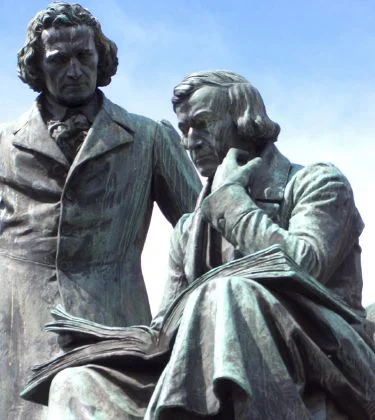
Word of the Day: Rune
For today’s word of the day, I have returned to the Old English Wordhord to pull out the word rune. The Old English is actually rӯne, pronounced /’rʏ nɘ/. I have used the International Phonetic Alphabet to describe the pronunciation despite the fact that some of you may not be familiar with the IPA, so let me explain. The apostrophe before rʏ indicates that that is the syllabus that should receive stress. The ʏ is a vowel sound like the “u” in English “mule,” sort of. Here is website where you can hear pronunciations of different Old English sounds. And whereas in Contemporary English we would have a silent e, that e was still pronounced in Old English, but it would have been pronounced as a schwa (that backwards e). Generally, in English, vowel sounds in unstressed syllables tend toward (or become more like) schwa before they finally disappear. For instance, my home town in Pennsylvania is spelled “Bethlehem,” but sometimes it is pronounced /’beð lɘ hɛm/ but more often pronounced as just two syllables, /’beð lɘm/. In fact, the word bedlam comes from the shortening of the name Bethlehem (https://www.etymonline.com/search?q=bedlam).
According to the Wordhord app, rӯne means “mystery, mysterious saying.” The website www.etymonline.com has a lot to say about rune: “’secret, mystery, dark mysterious statement, (secret) council,’ also ‘a runic letter’ (runstæf), from Proto-Germanic *runo (source also of Old Norse run ‘a secret, magic sign, runic character,’ Old High German runa ‘a secret conversation, whisper,’ Gothic runa), from PIE *ru-no-, source of technical terms of magic in Germanic and Celtic (source also of Gaelic run ‘a secret, mystery, craft, deceit, purpose, intention, desire,’ Welsh rhin ‘a secret, charm, virtue’).”
The etymology site then adds the following: “The word entered Middle English as roun and by normal evolution would have become Modern English *rown, but it died out mid-15c. when the use of runes did.” And also, “The presumption often is that the magical sense was the original one in the word and the use of runes as letters was secondary to ancient Germanic peoples, but this is questioned by some linguists. The runic alphabet itself is believed to have developed by 2c. C.E. from contact with Greek writing, with the letters modified to be more easily cut into wood or stone.” So once again we find linguists disagreeing with each other.
Speaking of linguists, on this date in 1785, Jacob Grimm was born. Known best for his collaboration with younger brother Wilhelm on Kinder- und Hausmärchen (Children’s and Household Tales), better known in English as Grimms’ Fairy Tales, Jacob Grimm was also one of the most important linguists in the history of the Germanic languages, and that includes English. His father was a lawyer, but the father died when Grimm was young. Helped by relatives, he eventually attended the University of Marburg, where his younger brother joined him a year later. He was supposed to study law, but due to the influence of Friedrich Carl von Savigny, a lecturer at Marburg, Grimm developed an interest in the scientific study of language and literature.
The Grimm brothers had an up-and-down academic career. They started as librarians—a perfect job for an antiquarian. They moved to the University of Göttingen where Jacob Grimm was a professor and librarian and Wilhelm Grimm was a librarian. Jacob Grimm lectured on a variety of topics, including historical grammar, literature, and especially old German poems. But along with five other professors, the Brothers Grimm protested some actions related to the university by the King of Hanover’s breaking of agreements with the faculty regarding the university’s constitution. All seven were dismissed from the university and banished from the Kingdom of Hanover (this was before Germany was unified). But both brothers were appointed to professorships at the University of Berlin, where Jacob Grimm worked until his death in 1863.
Along with Grimms’ Fairy Tales, which went through multiple editions after its initial publication in 1812, Jacob Grimm published the following:
Geschichte der deutschen Sprache (A History of the German Language)
Deutsche Grammatik (German Grammar)
Deutsches Wörterbuch (German Dictionary). This third book was a project that the brothers took on in 1838, thinking that it would take them about 10 years to complete and that it would be about six or seven volumes. They initially published a part of the work in 1854, but the full work was not complete until 1971, and it took up 33 volumes. In that respect its history is similar to the history of the Oxford English Dictionary, which is, in a sense, still incomplete because the editors add words to it every year.
But perhaps the most significant accomplishment of Jacob Grimm’s life, at least for those of us who study the English language, was Grimm’s Law. Grimm’s law defines a regular and consistent sound change between IndoEuropean and its Germanic offspring.
According to Wikipedia,
Grimm’s law consists of three parts which form consecutive phases in the
sense of a chain shift. The phases are usually constructed as follows:
Proto-Indo-European voiceless stops change into voiceless fricatives.
Proto-Indo-European voiced stops become voiceless stops.
Proto-Indo-European voiced aspirated stops become voiced stops or fricatives (as allophones).
For instance, the IndoEuropean word for fish is pisc, for foot is ped, and for father is pəter. Linguists before Grimm had noted some of these instances, but Grimm was the first to express the phenomenon in terms of a law. He himself recognized that there were some exceptions with his law that he could not answer, but the answer came some years later with Verner’s Law. In addition to the law itself, Grimm established the scientific nature of language study and inspired many others to take up the study of linguistics. It was almost as if Jacob Grimm had unlocked the mysteries of language.
The image today is of a statue of Jacob and Wilhelm Grimm “at Hanau, Germany. Jacob Grimm is in the foreground, seated” (https://www.newworldencyclopedia.org/entry/Jacob_Grimm).